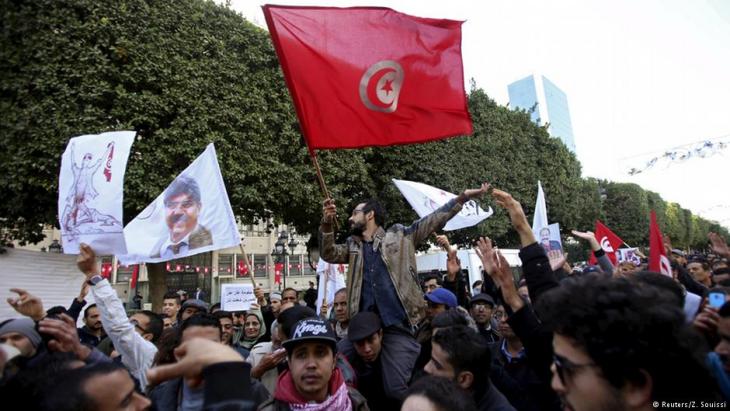The Maghrebʹs untenable status quo

"Investing in Stability" is the title of the final declaration of this weekʹs summit between the Arab League and the European Union. For years, stability in North Africa has been a dominant policy goal of the international community, driven by concerns about migration, terror and weakened states on Europeʹs doorstep.
Efforts to buttress stability have been at the heart of development assistance, security programmes and widespread diplomatic silence over deteriorating human rights. However, foreign policy approaches on North Africa often suffer from a misunderstanding of what stability means in the region – and risk actively undermining it.
The social contracts of the post-independence era are slowly collapsing and the support base provided by the traditional elites is shrinking. Change is coming, one way or the other – expanding protest movements across the region provide ample evidence of broader pressures.
In these times, a stable North Africa cannot mean retaining the status quo at all costs; instead, it should mean that the region is institutionally capable of managing change. To accomplish this, the primary deficit that must be addressed in most North African states is not stronger governments, but stronger opposition.

The state lacks an opposition
Morocco provides a prime example. For years, the monarchy has marketed itself internationally as a strong partner and an island of stability in a troubled region.
Domestically, it has successfully co-opted or repressed any opposition movements that have emerged to challenge the palaceʹs authority. But crushing the opposition has not weakened the drivers of resistance – uneven development, police violence, crony capitalism and corruption have alienated many Moroccans from their government.
In the last 12 months, protests have flared in economically marginalised regions such as the Rif and Jerada. Campaigns for womenʹs rights and against rising costs of living have percolated on social media and slogans against inequality and repression can be heard from football stadiums to the countryʹs beaches.
Post-independence social contracts are collapsing
However, as protest movements have evolved to become harder to subdue, they have also become more diffuse, leaderless and, as a result, harder to negotiate with.
An example of this is the nation-wide boycott – organised through social media – against three companies that are seen as engaging in corruption and profiteering. Although its lack of an identifiable leadership structure has allowed the boycott movement to mobilise widely – as it has been impossible to arrest its leadership – it has also made it impossible to elaborate its demands and negotiate its end.
Herein lies the real danger to the countryʹs stability: even as Moroccoʹs current social contract is in serious need of re-negotiation, there is no player left in the countryʹs political system who can credibly represent those alienated from the current system and help sell a negotiated change.In Tunisia – the regionʹs only democracy – an emphasis on consensus and strong governments has also led to the weakening of an effective opposition. Until the most recent divisions, the government had been comprised of a grand coalition of almost every party, few of which evinced significant differences on the policies necessary to confront severe economic and social problems.
Support for the government has eroded among Tunisians, leading to growing cynicism about a democratic process that seemed to prefer upholding the status quo rather than adjudicating options for managed change.
As the economic crisis has deepened, protests have mainly taken place outside of parliament, through general strikes, roadblocks, sit-ins and, most heartbreakingly, an increasing number of public suicides through self-immolation. As the country heads into an election year, its political and democratic future looks as uncertain as it has at any time since the 2011 revolution.
As a growing number of Tunisians become increasingly unhappy with the governmentʹs course, Tunisia, too, has found itself with a scarcity of credible political actors within its party system that are able to negotiate change. Like its neighbours, Tunisia desperately needs an opposition that can function as a "government in waiting."

An increasingly untenable status quo
Entering a new year, there are good reasons to believe that this issue will become more pressing across the region. That the elections in Tunisia and Algeria carry significant potential for mobilisation can already be observed. Elsewhere, Egypt may see a referendum on Abdul Fattah Sisiʹs presidency and the economic outlook is bleak across the whole of North Africa.
If the international community is genuinely interested in stability for the region, it should focus less on how to create strong governments and more on how to protect spaces in which strong representative opposition can emerge.
First, this means that social protests should not be perceived as threats to a stable status quo, but rather as indications of the pressures that make it increasingly untenable. As a consequence, state crackdowns on opposition movements should not be seen as a necessary cost of stability, but rather as the elimination of crucial partners for negotiating change, thereby directly and dramatically destabilising. Remaining silent about human rights abuses and restrictions on freedom of expression in the region is neither ethical nor pragmatic.
Second, the ongoing support for "stability" – especially in the digital and security sectors – needs to be critically evaluated for its effect on opposition movements.
Third, the international community should aim to foster broader dialogue and a more diverse pool of voices, without getting so close that it risks co-opting or delegitimising them. Crucially, this implies remaining sceptical of the language with which regimes in the region at times characterise their opposition as being unruly, violent, or terrorist.
None of these approaches are new, but they are too often portrayed as conflicting with stability. The opposite is the case.
Max Gallien
© SWP | Stiftung Wissenschaft und Politik 2019 (German Institution for International & Security Affairs)
